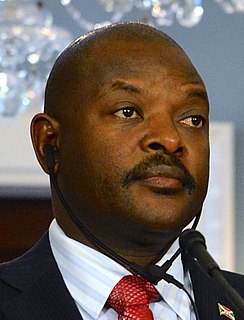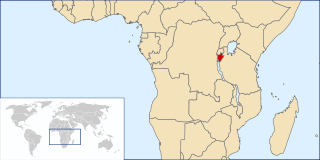
The Burundian Civil War was a civil war in Burundi lasting from 1993 to 2005. The civil war was the result of long standing ethnic divisions between the Hutu and the Tutsi ethnic groups in Burundi. The conflict began following the first multi-party elections in the country since independence from Belgium in 1962, and is seen as formally ending with the swearing in of Pierre Nkurunziza in August 2005. Children were widely used by both sides in the war. The estimated death toll stands at 300,000.

Pierre Nkurunziza was a Burundian politician who served as the ninth president of Burundi for almost 15 years from August 2005 until his death in June 2020. A member of the Hutu ethnic group, Nkurunziza taught physical education before becoming involved in politics during the Burundian Civil War as part of the rebel National Council for the Defense of Democracy – Forces for the Defense of Democracy (CNDD–FDD) of which he became leader in 2000. The CNDD–FDD became a political party at the end of the Civil War and Nkurunziza was elected president. He held the post controversially for three terms, sparking significant public unrest in 2015. He announced his intention not to stand for re-election in 2020 and instead ceded power to Évariste Ndayishimiye, whose candidacy he had endorsed. He died unexpectedly on 8 June 2020 shortly before the official end of his term. He was the longest-ruling president in Burundian history.

The village of Gatumba lies on the western side of Burundi, near the border with the Democratic Republic of the Congo. The place is known for a massacre that took place at a refugee camp connected to the village.
The Titanic Express massacre was an event which took place on 28 December 2000, in which 21 people were killed in an attack on a Titanic Express bus, close to Bujumbura.

The National Liberation Front is an ethnically Hutu political party in Burundi that was formerly active as militant rebel group before and during the Burundian Civil War.
Charlotte Wilson was a British volunteer teacher working with the organisation Voluntary Services Overseas (VSO) in Rwanda. She was murdered in Burundi in December 2000 by the National Forces of Liberation, a Hutu rebel group, along with her Burundian fiancé and nineteen others travelling from Kigali to Bujumbura. The incident became known as the Titanic Express massacre, named after the bus service on which the victims were travelling.

The United Nations Integrated Office in Burundi (BINUB) was established by the United Nations Security Council to support the government of Burundi in its efforts towards long-term peace and stability and to replace the work of United Nations Operation in Burundi (ONUB). Its mandate was scheduled to begin on 1 January 2007 for an initial 12 months, and its creation and mission was as a result of recommendations in a report by the Secretary-General.

The National Forces of Liberation is a political party and former rebel group in Burundi. An ethnic Hutu group, the party was previously known as the Party for the Liberation of the Hutu People and adhered to a radical Hutu Power ideology, but since the mid- to late-2000s has moderated its stance and cooperated with the Tutsi-supported Union for National Progress party in opposition to the rule of Pierre Nkurunziza and the CNDD-FDD.

Agathon Rwasa is a Burundian politician and the leader of the National Liberation Forces. He was a Hutu militia leader during the Burundi Civil War.
The Guardians of the Peace were a pro-government paramilitary militia active in Burundi during the Burundian Civil War (1993–2006). It is believed to have existed between 1997 and 2005. According to the government, the militia was primarily intended to secure the rural areas against rebel groups as part of a policy of "civilian self-defence". Its members were armed but not uniformed. It was founded by Colonel Ascension Twagiramungu and is believed to have recruited primarily among adolescents, children and former anti-government rebels in rural Burundi. Although recognised as a semi-official organisation, the Guardians of the Peace were never a single entity and instead consisted of autonomous regional groups.
Michael Courtney was an Irish prelate of the Catholic Church. He entered the diplomatic service of the Holy See in 1980 and was given the rank of archbishop and named Apostolic Nuncio to Burundi in 2000.

Presidential elections were held in Burundi on 28 June 2010. As a result of withdrawals and alleged fraud and intimidation, incumbent President Pierre Nkurunziza was the only candidate.

United Nations Security Council resolution 1375, adopted unanimously on 29 October 2001, after reaffirming all resolutions and statements by the President of the Security Council on the civil war in Burundi, endorsed efforts by South Africa and other states to implement the Arusha Accords and supported the establishment of an interim multinational security presence in Burundi.

United Nations Security Council resolution 1602, adopted unanimously on 31 May 2005, after recalling resolutions 1545 (2004), 1565 (2004), 1577 (2004) and 1596 (2005) on the situation in Burundi, the Council extended the mandate of the United Nations Operation in Burundi (ONUB) for a period of six months until 1 December 2005.
United Nations Security Council Resolution 1791 was unanimously adopted on 19 December 2007.
United Nations Security Council Resolution 1858 was unanimously adopted on 22 December 2008.

On the night of June 6–7, 2014, the village of Mutarule, near Luberizi, in South Kivu, Democratic Republic of the Congo, was attacked. Around 35 people were killed in the attack, with the exact count varying. It is thought the attack was revenge for the death of a cattle herder who died in a failed robbery. The attack may have also been ethnically motivated.
The Popular Forces of Burundi is a Burundian rebel militia, active in the eastern Democratic Republic of the Congo. Founded in 2015, the group opposes the government of Pierre Nkurunziza. It was previously known as the Republican Forces of Burundi.











